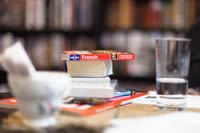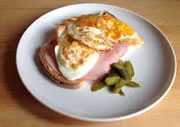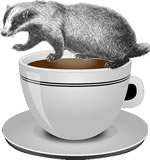| français | English | Cymraeg |
|---|---|---|
| l’hémorragie (f) | haemorrhage | gwaedlif; gwaedlin |
| faire une hémorragie | to haemorrhage; to have a haemorrhage | cael gwaedlif; colli gwaed |
| le bouclier | (soldier’s) shield | tarian; bwcled |
| le bouclier antiémeute | riot shield | tarian rhag terfysg |
| la protection; l’écran (m) | shield (protection) | sgrîn; giard; gorchudd |
| l’écran de protection | heat shield | tarian wres |
| le protège-dents | gum shield | gorchudd dannedd; arbedwr |
| l’écu (m); l’écusson (m) | shield (heraldry) | tarian |
| l’héraldique (f) | heraldry | herodraeth |
| le blason | coat of arms; blazon | arfbais; pais; arfau |
| protéger | to shield | gwarchod |
| le piment (rouge) | chilli (spice) | chilli; tsili |
| le poudre de piment | chilli powder | powdr chilli |
Month: February 2014
How to Start Learning a New Language
Today we have a guest post by Kerstin Hammes of Fluent, the Language Learning Blog.

It’s great to get started with a new hobby, and part of the excitement is always the shopping trip for new kit. This is no different with language learning. It doesn’t matter if you follow a polyglot’s online method or you have joined a class at the local college. The right set of tools will set you up for a great job, and there are a few starting items that no language learner should be without.
Your Notebook
I’ve seen way too many students turn up with loose scraps of paper. Don’t be that kid: New notebooks are practically hobby law. You need to write, it is an important part of your learning styles and will make you a stronger learner.
Even where information has moved online and you can get the greatest courses without a page of print, I still find that paper notebooks are important. Writing things down allows you to organise the thoughts in your own way. It also drills in correct spellings, and builds personalised notes that you can revise very easily.
It’s a good idea to create sections in your notebook for new vocabulary, grammar rules, exercises, tutor sessions and course notes. Project notebooks like this pretty one have the sections built into them, so they are my best recommendation.
Your Dictionary
No matter if you prefer looking words up online or on paper, your dictionary should always be on hand. There is no quicker way of getting past a block or understanding a song/film quote in your target language.
Good dictionaries I’ve used in the past have been Pons (in the UK they work with Collins) and Oxford Hachette ones, but whichever brand you choose you should make sure that the index makes sense to you. A good dictionary must tell you the word type, gender, pronunciation and give an indication of how to use the word.
Many dictionaries give you the bonus of a good grammar and verb section, saving you money on separate verb tables or grammar books.
An audio device, ideally with a sound recorder
Language is about saying things, so make sure you learn speaking as well as writing, reading and listening. This isn’t really new: You know that textbooks and learning sets have come with helpful recordings since the times of vinyl. Today, podcasts and audiobooks are particularly useful and allow you to practice language learning on the go.
Once you’ve made sure you can hear the language, get talking too! Record yourself for personal feedback and share the recordings with your tutor. It is easy to record yourself on most smartphones. When I worked on my European Day of Languages video, I found surprising amounts of kind people who would correct small batches of pronunciation when I sent them an audio file – all on Facebook and Twitter!
The Course
If you are beginner, choose your preferred method. Don’t worry too much about what you choose, but at the same time buy the tools, not the whole toolshed (in other words, pace yourself).
The most popular options are group classes, private tutors, software kits and teach yourself books. I’m a tutor who has worked with many complete beginners, and have found that combining the personal lessons with real life examples and a textbook makes the learning fun and interesting for everyone. Why not do online shopping in German, for example?
Personally, I’m not a good off-screen learner and so I tend not to invest in Rosetta Stone etc., and I also prefer finding a tutor or attending group lessons just so I can keep a bit of structure in my life!
Your Attitude
Finally, there is the attitude of course. All new things are exciting for the first month or so (well, except for Weight Watchers probably). But what really matters is that you decide to commit and stick with your journey over a longer period of time. Goal setting can really help here: Don’t read too much online about what other people can do in 3 months. They don’t have your life, your job, your family or your schedule. If you think you can do more, then do it. 3 words a day, 10 minutes a day or an hour every day can all work.
Make the goals dependent on your own achievements, such as “write 20 sentences”. Avoid vague expressions like “I want to be fluent” or “I want to talk to a native speaker”, because fluency is difficult to measure and native speakers can have bad days. Language learning is for life, so you are in this for the long haul, you can take the scenic route or the motorway, and you progress in the way that suits you.
Kerstin edits and runs Fluent, the Language Learning Blog. She speaks 5 languages, teaches German and English and also offers classes in Blogging and Online Marketing in Northern England.
Uitsmijter

The other day I came across the wonderful Dutch word uitsmijter, which means bouncer or doorman, and also a type of food consisting of toast, egg(s), ham, bacon or other meat, cheese and pickles is various combinations.
Apparently this is the kind of thing that some Dutch people like to eat after the bars close and the uitsmijters throw them out, which one possible way the dish got its name. Another explanation for the name is that it’s something that easily made and ‘thrown out’ of the kitchen [source]. It’s also popular as a breakfast and lunch dish.
The word uitsmijter comes from uit (out) and smijten (to fling, throw, hurl, smite, heave), so an uitsmijter is a thrower/flinger out. Smijten comes from the Middle Dutch smiten, from the Old Dutch *smītan, from the Proto-Germanic *smītaną (to cast, hurl, hit, strike, smear, dirty), from the Proto-Indo-European *smeyd- (to smear, whick, strike, rub), which is also the root of the Low German smieten (to throw, cast, chuck), the West Frisian smite (to throw), the German schmeißen (to throw, fling, slam), the English smite, and the Danish smide (to toss) [source].
Are there dishes with similarly interesting names in your country?
Language quiz
Here’s a recording in a mystery language.
Can you identify the language, and do you know where it’s spoken?
Ilka dae
While flicking through my Scots language course, Luath Scots Language Learner, this week I discovered that the Scots for every day is ilka dae, which is quite similar to the Dutch elke dag, which I also learnt recently – I like finding connections like this. Neither resembles the English version, or the German jeden Tag. The words for every in other Germanic languages are also different: hver/alle in Danish, hver/enhver/all Norwegian, and var/all in Swedish.
The Scots word ilka [ˈɪlkə], which is also written ilkae and ilkie, means every and each. It appears in such expressions as:
– ilka bodie = everyone
– ilka thing = everything
– ilka ane (yin/een) = each one, every one
– ilkaday = everyday
– ilka where = everywhere
According to the OED ilka is a combination of ilk (every) and a (the indefinite article): ilk is a northern and north-midland form of ilch, iche = southern ælch, æche (each), which come from the Old English ǽlc, which is related to the Old Frisian ellîk/elk/êk, and the Dutch elk, from the Old High German eogilîh.
Sources: bab.la Dictionary, Reverso, DSL, EUdict, OED
Les mots de la semaine
| français | English | Cymraeg | Brezhoneg |
|---|---|---|---|
| l’avant-dernier | the last but one | yr olaf/diwethaf ond un | |
| la tuile | (roof) tile | teilsen; teilen; priddlech | teol |
| le carreau | (wall/floor) tile | teilsen (lorio/wal) | karrezenn |
| carreler | to tile (a floor) | llorio â theils; teilsio | |
| la dalle de moquette | carpet tile | teilsen garped | |
| faire la fête/la java | to have a night on the tiles | cael noson ar y criws / ar y sbri | ober bos/fest |
| l’âne (m); le cancre; l’imbécile; un(e) nullard(e) | dunce | dỳns; twpsyn; penbwl | azen; penn-karn; yann ar yod; paotr ar yod; loull |
| le bonnet d’âne | dunce’s cap | cap twpsyn/dỳns/papur; capan penbwl | |
| la loupe (grossissante) | magnifying glass | chwyddwydr | loupenn |
| à la loupe | in minute detail | mewn manylion lleiaf | |
| sous la loupe | under the microscope | dan y microsgop |
An owlfully badgered cup of tea

Yesterday I discovered that the Italian word for cup, tazza, is rather similar and possibly confusable with the word for badger, tasso, which can also mean a rate (of exchange) or a yew (tree).
It’s unlikely that if you mistakenly ask for un tasso di tè rather than una tazza di tè, you will be given a badger of tea, but it would be an easy mistake to make, especially if you know the French word for cup, tasse, or the Spanish taza, or the German Tasse, which comes from the French, which comes from the Arabic طاس (ṭās – die; bowl), from the Persian تاس (tās – die/dice).
I also discovered the wonderful word owlful, which means full of badgers, or possibly full of owls. How awful it must be to be owlful! It’s a word that should have appeared in the Harry Potter books, which are brimful of owls at points, and slightly, though not entirely, badgerless.
Language quiz
Here’s a recording in a mystery language.
Can you identify the language, and do you know where it’s spoken?
Sumpf
I discovered the wonderful German word Sumpf /zʊmpf/ today while putting together les mots de la semaine for this week from the French conversation group. One of the things that came in conversation was the word marsh, which is le marais or le marécage in French, and Sumpf in German, which I noticed because there’s something about the combination of mpf in a word that just appeals to me. Are there particular letter combinations that appeal to you?
Sumpf means marsh, morass, mud, bog, quagmire, mire, sump, and can also be used figuratively to refer to corruption, e.g. der Sumpf der Politik = the murky waters of politics.
Related expressions include:
– Sumpfland = marshland; swampland
– sumpfig = marshy; swampland
– Sumpfboden = marshy ground
– sumpfen = to live it up
– Sumpfdotterblume = marsh marigold
– Sumpfpflanze = marsh plant
– Sumpfgas = marsh gas
– Salzsumpf = salt marsh
The word marsh comes from the Germanic base of mere (sea, lake), which is cognate with the Latin mare, and related words in many European languages; plus the suffix -ish (of or belonging to a person or thing, of the nature or character of).
Sources: Wiktionary, Reverso, OED, bab.la dictionary
Les mots de la semaine
| français | English | Cymraeg | Brezhoneg |
|---|---|---|---|
| vaciller; danser | to flicker (light) | fflachio; neidio | trabellat; horellat |
| le vacillement | flicker (flames) | naid; dychlamiad | horelladenn |
| la lueur | flicker (light) | llygedyn | skleur |
| la coupure de courant | power cut | toriad trydan | troc’h tredan |
| le véhicule haut | high-sided vehicle | cerbyd ochrau uchel | karbed uhel (?) |
| se retourner | to overturn | troi drosodd | treiñ |
| marécageux | marshy | corslyd, corsiog, siglennog | geunieg; gwazheg |
| le marais; le marécage | marsh | cors | gwern; gwazh |
| le marais salant; le salin | salt marsh | morfa heli | palud-holen; holenek |